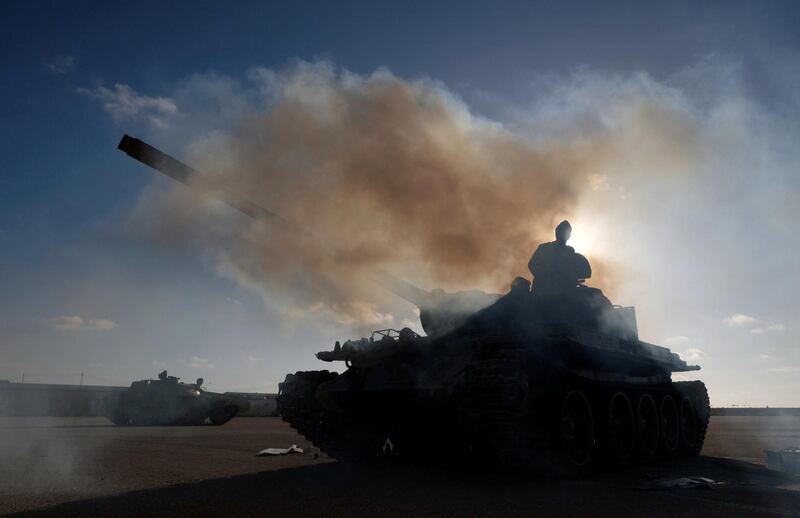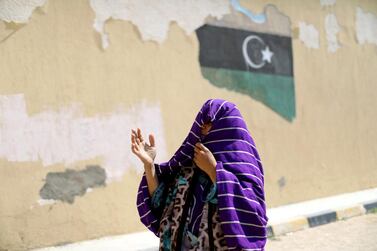The UN Security Council was on Tuesday considering a draft resolution demanding an immediate ceasefire in Libya, saying the nearly two-week-long offensive by Field Marshal Khalifa Haftar's force threatens to destabilise the country.
Discussions of the resolution, which is the strongest measure yet considered by the UN after Field Marshal Haftar's sudden advance on Tripoli, follow days of debate about how to stop the clashes.
Since fighting broke out on April 4, 174 people have been killed and 756 wounded, the World Health Organisation said on Tuesday.
The proposed resolution said the action by Field Marshal Haftar's Libyan National Army "threatens the stability of Libya and prospects for a United Nations-facilitated political dialogue and a comprehensive political solution to the crisis".
The 15-member council "demands that all parties in Libya immediately de-escalate the situation, commit to a ceasefire, and engage with the United Nations to ensure a full and comprehensive cessation of hostilities throughout Libya".
Nine votes are needed to pass a resolution, with no vetoes by the US, Britain, France, Russia or China.
It is unclear when the council will vote on the draft resolution but diplomats have called for quick action to prevent an all-out war in the capital. Resolutions adopted by the council are legally binding.
The draft resolution urges all member states to use their influence over the parties in Libya to stick to the resolution.
Field Marshal Haftar, who backs a rival administration in eastern Libya that is refusing to recognise the authority of the UN-backed Tripoli government, has declared that he wants to seize the capital, which is defended by militias.
There are fears that the growing number of civilians fleeing the city could turn into a flood as fighting rages.
A total of 18,250 people have fled their homes, the International Office of Migration says, while the city struggles to cope with cuts to electricity, phones and water supplies.
Basic services in Tripoli, especially hospitals, are in crisis after 11 days of fighting.
The WHO said on Twitter that it had sent more surgical staff to support hospitals that received trauma cases.
Office of migration officials are supplying food and water to 800 migrants stranded in detention camps near the fighting.
“We remain concerned over the safety of all civilians in Tripoli, especially detained migrants,” the agency said.
Field Marshal Haftar’s forces predicted victory within days but Prime Minister Fayez Al Sarraj’s internationally recognised government has managed to stall them in Tripoli's southern suburbs, with help from armed groups from western Libyan factions.
The LNA continues to pound militia positions with artillery and air strikes, and army spokesman Col Ahmed Al Mesmari said progress was being made.
“We have had some very successful operations by the air force,” Col Al Mesmari said. “The ground forces are moving in seven axes and are approaching the centre of Tripoli.”
Social media reports and video from front lines that curve along Tripoli’s southern suburbs show the LNA 11 kilometres from the city centre.
Both sides are using air strikes, tanks and artillery fire, and accuse each other of targeting civilians and war crimes.
Mr Al Sarraj warned that if fighting continues, it would send a flood of migrants to Europe.
"What's going to happen with this security breakdown is that 800,000 illegal migrants on Libyan ground will have to leave Libya and will cross the sea towards Europe," he said.
“Among these 800,000 there are terrorists and criminals. This will be disastrous.”
The push towards Tripoli has forced the UN to postpone a national conference that was to draw up a roadmap to elections.
It was hoped that the elections could end years of chaos since the 2011 removal of Libya's longtime dictator, Muammar Qaddafi.
UN Secretary General Antonio Guterres, who was in Libya to personally advance prospects for a political solution when the offensive was launched, called for a ceasefire at the time.
The Security Council informally expressed concern on April 5, calling on all forces to de-escalate, particularly the LNA.
But in the following days the council was unable to issue a more formal statement, with members contesting the wording of the proposed text.






